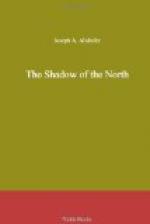“Come, come, Lennox! You go too far! I can admit the possibility of the snow shoes and their appearance at the very moment they’re needed, but the evocation of a river and a canoe at the opportune instant puts too high a strain upon credibility.”
“Then don’t believe it unless you wish to do so,” laughed Robert, “but as for me I’m not only believing it, but I’m almost at the stage of knowing it.”
The flood was so great that all hunting ceased for the time, and the men stayed under shelter in the fort, while the fires were kept burning for the sake of both warmth and cheer. But they were on the edge of the great Ohio Valley, where changes in temperature are often rapid and violent. The warm rain ceased, the wind came out of the southwest cold and then colder. The logs of the buildings popped with the contracting cold all through the following night and the next dawn came bright, clear and still, but far below zero. The ice was thick on the creek, and every new pool and lake was covered. The trees and bushes that had been dripping the day before were sheathed in silver mail. Breath curled away like smoke from the lips.
“If Tayoga stayed in his canoe,” said Wilton, “he’s frozen solidly in the middle of the river, and he won’t be able to move it until a thaw comes.”
Robert laughed with genuine amusement and also with a certain scorn.
“I’ve told you many times, Will,” he said, “that you didn’t know all about Tayoga, but now it seems that you know nothing about him.”
“Well, then, wherein am I wrong, Sir Robert the Omniscient?” asked Wilton.
“In your assumption that Tayoga would not foresee what was coming. Having spent nearly all his life with nature he has naturally been forced to observe all of its manifestations, even the most delicate. And when you add to these necessities the powers of an exceedingly strong and penetrating mind you have developed faculties that can cope with almost anything. Tayoga foresaw this big freeze, and I can tell you exactly what he did as accurately as if I had been there and had seen it. He kept to the river and his canoe almost until the first thin skim of ice began to show. Then he paddled to land, and hid the canoe again among thick bushes. He raised it up a little on low boughs in such a manner that it would not touch the water. Thus it was safe from the ice, and so leaving it well hidden and in proper condition, and situation, he sped on.”
“Of course you’re a master with words, Robert, and the longer they are the better you seem to like ’em, but how is the Onondaga to make speed over the ice which now covers the earth? Snow shoes, I take it, would not be available upon such a smooth and tricky surface, and, at any rate, he has left them far behind.”




